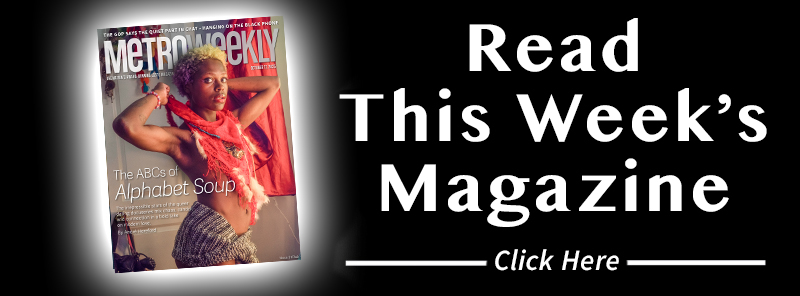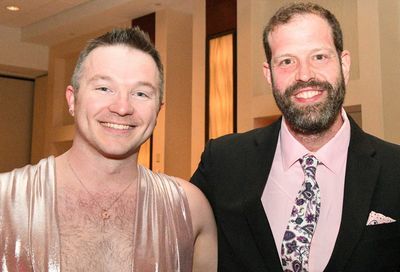Habit Forming
In Alan Bennett's new play, greatness and the mundane all come from the same place -- showing up every day to get the job done
To make great art, you simply have to be in the habit of making art, period. The trick is, art needs an audience along the way — especially for the mediocre stuff — or there won’t be anyone there to see the greatness when it happens.
That’s the point of The Habit of Art, the latest creation by British playwright Alan Bennett (The History Boys, The Madness of King George), a conclusion reached after a rehearsal at the National Theatre in London. The play within Bennett’s play is a lurching, sprawling mess by an uptight writer, Neil (Wynn Harmon), who’s popped in to see how ”Caliban’s Day” — his often-ridiculous ode to British cultural titans W.H. Auden and Benjamin Britten — is shaping up.

Habit of Art
(Photo by Scott Suchman)
The director is away at a theater conference in Leeds. (The provinces, you see, must support the habit of art, too, even at art’s expense.) Stage manager Kay (Margaret Daly) is left to oversee a runthrough during which it becomes clear that it’s egos she’s managing as much as anything. Neil is horrified by changes that have been made to the script, the actors are horrified by the script itself, and it’s all Kay can do to keep a semblance of order.
It’s intriguing to see a writer of Bennett’s stature give an ”inside baseball” take on his craft at this stage of his game. And it’s intriguing that this is the context he’s chosen for tipping his hat to two such revered figures — the poet Auden and the composer Britten.
Or maybe Bennett doesn’t revere them as much as you might think. ”Caliban’s Day” brings Auden and Britten — once close friends and collaborators — together in their sunset years after a quarter-century of estrangement. It’s 1972, and they’ve both wound up in Oxford. Ted van Griethuysen is Fitz, the actor portraying Auden, and Paxton Whitehead is Henry, the actor portraying Britten. The playwright Neil (and, by proxy, Bennett himself) relishes the ribald aspects of the titans’ lives: Auden, doddering about in a filthy flat, using his kitchen sink as a urinal, loves rentboys; Britten, struggling with his final opera, Death in Venice, loves choirboys.
He’s sought out Auden for validation that Death in Venice — about a man whose adoration of youthful beauty leads to his demise — is a worthy undertaking. And Auden, writing every day (because he has ”the habit of art”) but with no real demand for his output, responds with the same kind of overbearing intensity that apparently sabatoged his relationship with Britten years earlier.
”Caliban’s Day” does manage to provide gripping moments of insight into Auden and Britten’s bond, but they reflect the skill of a much better writer than Neil — who includes sequences where things such as a fountain pen and Auden’s wrinkles come to life to speak in outlandish soliloquies — could possibly be.
Bennett may be correct that theater relies on the habit of art, but it also requires the willing suspension of disbelief — and you may not be able to suspend as much disbelief as The Habit of Art asks you to.



To Oct. 16
Studio Theatre
1501 14th St. NW
$35-$69
202-332-3300
studiotheatre.org
By contrast to ”Caliban’s Day” itself, the hyperrealism and comedic flourishes surrounding its rehearsal are quite easy to buy into, and quite enjoyable. Van Griethuysen’s Fitz struggles with his lines, but is it because Neil’s script can be so misguided, or is it simply because he’s as doddering as the Auden he’s playing? The gleam in his eye serves as a laser beam aimed at Neil; with it and a few choice words, he keeps cutting Neil down to size, while Whitehead’s Henry is never far behind with choice catty words of his own about the proceedings, particularly where the rentboy Stuart, nicely portrayed by Tim (Randy Harrison of Queer as Folk), is concerned.
Surely Auden and Britten deserve better treatment than ”Caliban’s Day.” And if so, does that mean they deserve better treatment than The Habit of Art? Perhaps so. Or maybe that’s precisely Bennett’s point: that greatness and the mundane all come from the same place — showing up every day to get the job done.
Support Metro Weekly’s Journalism
These are challenging times for news organizations. And yet it’s crucial we stay active and provide vital resources and information to both our local readers and the world. So won’t you please take a moment and consider supporting Metro Weekly with a membership? For as little as $5 a month, you can help ensure Metro Weekly magazine and MetroWeekly.com remain free, viable resources as we provide the best, most diverse, culturally-resonant LGBTQ coverage in both the D.C. region and around the world. Memberships come with exclusive perks and discounts, your own personal digital delivery of each week’s magazine (and an archive), access to our Member's Lounge when it launches this fall, and exclusive members-only items like Metro Weekly Membership Mugs and Tote Bags! Check out all our membership levels here and please join us today!

























